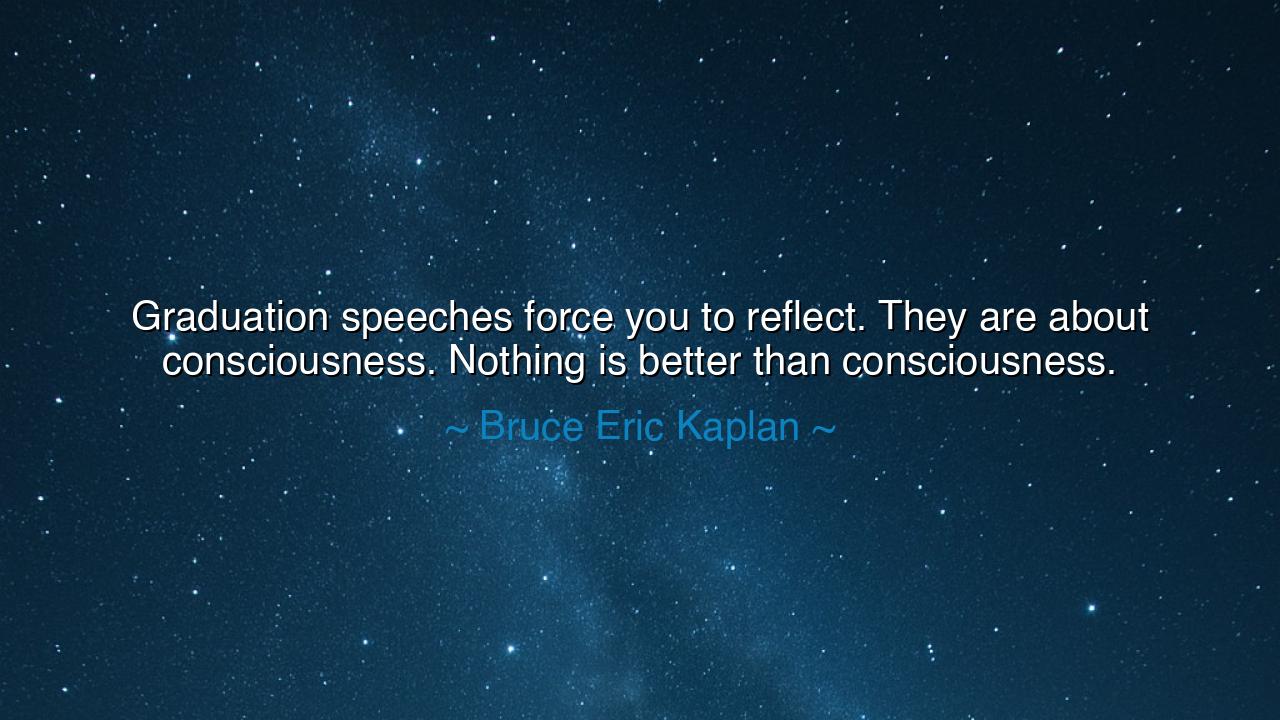
Graduation speeches force you to reflect. They are about
Graduation speeches force you to reflect. They are about consciousness. Nothing is better than consciousness.






In the words, “Graduation speeches force you to reflect. They are about consciousness. Nothing is better than consciousness,” Bruce Eric Kaplan offers a truth as subtle as breath yet as vast as the sky — that the highest act of human life is to be aware, to awaken to the unfolding mystery of one’s own existence. Beneath the surface of this simple reflection lies the eternal rhythm of wisdom itself: that to live unconsciously is to drift through the world as a shadow, but to awaken — to reflect, to see — is to become truly alive. The graduation speech, in its ceremonial form, becomes here a metaphor for life’s sacred pauses, the moments when time itself stands still and the soul is called to witness its own becoming.
Kaplan, a writer and cartoonist renowned for his quiet insight into the absurdity and poignancy of modern life, sees in such speeches not mere ritual but a mirror held to consciousness itself. When one stands before a group of graduates, one is not speaking about the world as it is, but as it might yet become. These speeches are invitations — invitations to remember who we have been, to recognize the pattern of our choices, and to look toward the horizon of our becoming with open eyes. In that sense, the “speech” is not just the speaker’s; it belongs to everyone who listens and dares to reflect. To pause and look inward, to measure one’s steps against one’s ideals — this is the heart of consciousness, and indeed, as Kaplan says, nothing is greater.
The origin of Kaplan’s reflection is not academic but experiential. As a storyteller, he has long sought to illuminate the inner workings of the human mind — the fears, contradictions, and quiet hopes that make us who we are. His words remind us that education, in its truest form, is not the gathering of facts, but the awakening of perception. When he says that nothing is better than consciousness, he speaks as one who has seen the cost of its absence — how easily life slips into routine, how swiftly ambition can replace awareness, and how the modern soul, distracted and hurried, forgets the miracle of simply being. Thus, in the sacred stillness of reflection, the graduate — and the human being — reclaims what is most essential: presence.
The ancients understood this truth well. Socrates, that first philosopher of awareness, declared that “the unexamined life is not worth living.” He meant that knowledge without reflection is hollow, action without awareness is blind. His life, spent questioning others and himself, was a continual graduation speech — a lifelong address to the human spirit, urging it to wake from complacency. When the Athenian court condemned him to death for this very practice of questioning, Socrates drank the hemlock calmly, for he had already attained the freedom of consciousness — the peace that comes from knowing one’s own truth. Like Kaplan, he believed that reflection is not a luxury, but a necessity for the soul.
Kaplan’s declaration — “Nothing is better than consciousness” — is both exalted and humbling. It suggests that awareness is not merely an intellectual state, but a moral and spiritual one. To be conscious is to see the world not only as it appears, but as it truly is — to perceive the suffering of others, the impermanence of joy, the beauty in imperfection. It is to live with eyes open, not only outward but inward, toward one’s motives, biases, and hopes. Consciousness is both torch and burden; it illuminates, but it also demands responsibility. To be awake is to know that one’s life, however small, shapes the fabric of all others.
Consider the story of Helen Keller, who, though deaf and blind, became one of the most luminous minds of her time. When her teacher, Anne Sullivan, first taught her the word “water,” consciousness entered her world like dawn breaking after endless night. Keller later wrote, “Once I knew that the word meant the wonderful cool something that was flowing over my hand, the living word awakened my soul.” Her awakening was literal, but also symbolic of the awakening each of us must undergo — the shift from living by habit to living by awareness. In that moment of recognition, Helen Keller embodied Kaplan’s truth: nothing is better than consciousness.
The lesson of this quote is both ancient and immediate: reflection is the path to freedom. To know oneself, to pause and think deeply about one’s journey, is to reclaim one’s life from the tyranny of haste. The unexamined moment slips away unnoticed; the conscious one lingers, glowing with meaning. We are called, then, not merely to live, but to wake up — to see with clarity, to listen with humility, and to act with understanding. This is the essence of wisdom.
And the practical action is this: take time each day to reflect — not only on what you have done, but on why you have done it. Speak to yourself as if delivering your own graduation speech: what have you learned, what have you lost, what will you become? Cultivate awareness not only of your successes, but of your blind spots, your silences, your humanity. For as Bruce Eric Kaplan reminds us, in the end, titles fade, achievements blur, and applause dies away — but consciousness endures, shining quietly, the lamp of the soul that transforms mere existence into the art of truly being alive.






AAdministratorAdministrator
Welcome, honored guests. Please leave a comment, we will respond soon